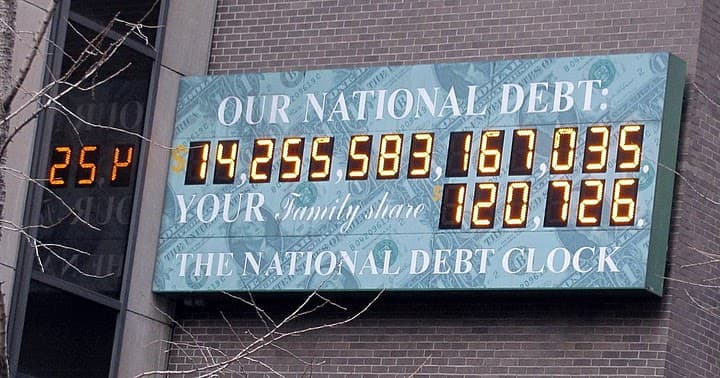Democrats, GOP Point Fingers as National Debt Surpasses $34 Trillion With No End in Sight
‘There is not a single economic reason to add to the debt at the rate we are, but sadly our political leaders are unwilling to make the changes we need to turn the fiscal situation around,’ one budget hawk says.

Politicians from across the political spectrum pointed accusatory fingers at each other Wednesday after the Department of the Treasury announced that America’s national debt reached $34 trillion for the first time at the end of 2023.
The new figure — $34.001 trillion as of December 29, 2023, according to the Treasury — represents an increase of $1 trillion in the last three months alone. The debt is now at the highest level compared to the nation’s gross domestic product since the end of World War II.
The president of the nonpartisan Committee for a Responsible Federal Budget, Maya MacGuineas, called the milestone a “truly depressing ‘achievement.’”
“There is not a single economic reason to add to the debt at the rate we are, but sadly our political leaders are unwilling to make the changes we need to turn the fiscal situation around,” Ms. MacGuineas said.
Four years ago, in January 2020, the Congressional Budget Office projected that the debt would not exceed $34 trillion until 2029. The president of the budget-hawkish Peterson Foundation, Michael Peterson, said in a statement that the current trajectory does not appear to be slowing down even as Congress and the White House face another spending fight in the coming days.
“Looking ahead, debt will continue to skyrocket as the Treasury expects to borrow nearly $1 trillion more by the end of March,” Mr. Peterson said. “Adding trillion after trillion in debt, year after year, should be a flashing red warning sign to any policymaker who cares about the future of our country.”
“On our current path, important programs like Medicare and Social Security will both face the depletion of their trust funds within a decade,” Mr. Peterson added. “Despite these clear and present fiscal dangers, our leaders are still debating this year’s appropriations, with a potential government shutdown looming.”
The White House immediately blamed Republicans for the escalating crisis, calling the arrears a “trickle-down debt” caused by GOP tax cuts in 2017.
“Congressional Republicans want to double down on MAGAnomics with more than $3 trillion in giveaways skewed to the wealthy while forcing hard-working Americans to pay the price by cutting Social Security, Medicare, and Medicaid,” a White House spokesman, Michael Kikukawa, told Reuters.
Republicans, though, were quick to counter with assertions that it is the Biden administration’s “reckless spending” that is driving up the debt. In a social media post, Senator Scott noted that the debt grew by a trillion dollars in the last 105 days alone. “When Biden took office, the national debt was $27 trillion,” he said. “Today it’s $34 trillion. He is destroying our country with his reckless spending.”
Campaigning in New Hampshire, one GOP presidential hopeful, Nikki Haley, sounded a similar alarm. “This reckless spending is stifling our economy, hurting families, and making America weaker,” she said. “Republicans and Democrats are both to blame. It’s time to stop the spending and stop the borrowing.”
Next week, Congress begins another round of fighting with the White House about government spending levels. Republicans in the House want to trim federal discretionary spending next year, but the White House has so far stood firm — demanding that Republicans stick to spending levels agreed upon during the last budget dust-up in June as well as approve new aid packages to Ukraine and Israel.
The two sides will need to come to an agreement and pass a dozen spending bills by January 19 and February 2 to avoid a government shutdown.
Ms. MacGuineas said she remains hopeful despite the very real risk that lawmakers at Washington will make matters worse during the coming campaign season by passing new tax cuts or spending increases in an effort to get re-elected.
“We can be a weak divided country where our leaders fight, pander, and take the easy way out while we become increasingly vulnerable, or we can do the hard work to be stronger, more secure, and more prosperous for the long run,” she said. “This is a moment of consequence and continuing to refuse to pay our own bills will not lead us to where we need to be as a nation.”

